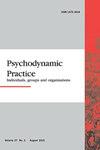“只留下无事可想的日益增长的恐惧……”(T.S.艾略特,1944)在治疗中面对空虚感
IF 0.4
Q4 PSYCHOLOGY, CLINICAL
引用次数: 0
摘要
我喜欢爱德华·霍珀(Edward Hopper, 1882-1967)的画:其中一幅画中,一个人独自站在加油站。然后,一个男人独自在一间办公室里,高高在上。一个戴着红色帽子的女人盯着手里的小茶杯。有时会有一群人聚在一起,但即便如此,也会有一种被困在那个亲密空间里的人的感觉,那里的目光是向外的,但目光却是向内的。通常在凝视中,霍珀似乎捕捉到了一种空虚感。我们有时都会有这种感觉,但也会感到原始、暴露,在被观察时唤起恐惧或赤裸的感觉。就像被发现了一样。别人窥见了秘密;在这一切的背后,是空虚。t·s·艾略特在他的诗集《四个四重奏》中描述了空虚暴露的时代以及由此产生的不安。就像剧场里的帷幕被卷走的那一刻,只剩下一片黑暗。或者一个令人难以置信的描述,当地铁在两个站之间停留的时间太长时,令人不安的时刻:本文章由计算机程序翻译,如有差异,请以英文原文为准。
“Leaving only the growing terror of nothing to think about … ” (T.S. Eliot, 1944) confronting a sense of emptiness in therapy
I love the paintings of Edward Hopper (1882–1967): In one there is a man alone at a gas station. Then, a man alone in an office, high above buildings. A woman with a red hat staring at a small teacup in her hands. Sometimes there are groups together, but even then, there is a sense of watching people who have been caught in that intimate space where the look is outwards, but the gaze, turned inwards. Often in the gaze, Hopper seems to capture a sense of emptiness. A sense we all have at times but can also feel raw, exposing, evoke fear or a feeling of nakedness when observed. It can be like being caught out. Someone else has glimpsed a secret; that underneath it all, there is emptiness. In his collection of poems, the Four Quartets, T.S Eliot describes the times when emptiness is exposed and the unease this creates. It is like that moment when the façade in the theatre is rolled away, leaving only blackness. Or an incredible description of the unsettling time when the underground train in the tube stops between stations just a little too long:
求助全文
通过发布文献求助,成功后即可免费获取论文全文。
去求助
来源期刊

Psychodynamic Practice
PSYCHOLOGY, PSYCHOANALYSIS-
CiteScore
0.90
自引率
0.00%
发文量
41
期刊介绍:
Psychodynamic Practice is a journal of counselling, psychotherapy and consultancy and it is written for professionals in all fields who use psychodynamic thinking in their work. The journal explores the relevance of psychodynamic ideas to different occupational settings. It emphasizes setting and application as well as theory and technique and focuses on four broad areas: •Clinical practice •The understanding of group and organisational processes •The use of psychodynamic ideas and methods in different occupational settings (for example, education and training, health care, social work, pastoral care, management and consultancy) •The understanding of social, political and cultural issues
 求助内容:
求助内容: 应助结果提醒方式:
应助结果提醒方式:


